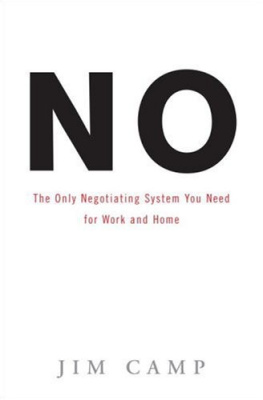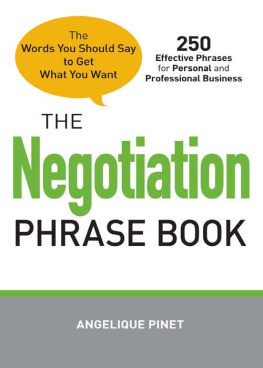Contents
Introduction
The Best Word in the English Language
Stop the Roller Coaster, I Want to Get Off
Controlling the Commotion of Emotion
So You Want Results?
Focus on What You Can ControlYourself
If You Want the Advantage, Take No for the Answer
Why No Is Great, Yes Is Bad, and Maybe Is the Worst
The Greatest Negotiation Secret Ever
Rooting Your Mission and Purpose in the World of the Other Side
How I Got My Boat
How Vision Drives Decisions
Socrates Has Nothing on You
The Art and Science of Asking Great Questions
Power Tools
3+, Stripping, and Not Presenting
The Truth Is, You Dont Know
Blank-Slating to Success
Whos Calling the Shots?
Finding the Real Decider
Getting What You Want
Building Your Success with Agendas
Managing the Real Price Being Paid
Budgeting Beyond Dollars and Cents
Perfect Preparation
The Ultimate Advantage in Any Negotiation
To my children,
Jim and Cynthia, Scott and Meredith,
Todd, Brian, and Kristi
Introduction
The Best Word in the English Language
T he best word in the English language must be yes. You please the other person. You satisfy the request. You get something done; you make a deal. Everyone is happy, break out the bubbly. Likewise, the worst word must be no. It rubs everyone the wrong way. It implies rejection and intransigence. It stops this deal right in its tracks. Its a killer.
Or so everyone in this compromise-and assumption-based world seems to believe. In truth, this thinking should be flipped on its head. In negotiation, yes is the worst word. It just betrays a fear of failure and a fear of losing this deal, and it primes you to please the other side, to rush ahead, to compromise early and often, to come to a deal, any deal. No is the best word. Its what you want to be prepared to say and to hear. No will liberate and protect you.
Consider Bill, a successful sales rep for Midwest Widgets (a ficticious name clearly, as are all other names in this book), who handles the Dumont account. Midwest has enjoyed Dumonts business for seven years, and theres been no indication that the situation is about to change. Midwest makes an excellent widget and gets a fair price for it. Suddenly, though, the largely ceremonial sales call to Dumont takes a nasty turn. Steve, the new purchasing agent, tells Bill out of the blue, Im sorry, but were changing our widget supplier. Im fed up with your companys arrogant behavior and have decided to choose from three of your competitors whove been beating down our door for years to get a piece of the action.
Bill, like many salespeople, immediately assumes that Steve and Dumont are actually maneuvering for a price discount, and he believes (assumes) his only recourse is to immediately give in and compromise. Drop the price and save the business. Bill instantly runs the numbers. How small a discount can he put on the table and keep the Dumont contract? How large a discount would cost him his job? Almost instinctively, he asks Steve what price will be required to keep the account. Steve has to work hard not to gloat in triumph. This was so easy. He already has Bill exactly where he wants him, and he replies, Well, Bill, I appreciate your willingness to give us a better deal, but Im not sure you can keep the business at any price. But Im willing to go to bat for you with my committee if you knock fourteen cents off the unit price.
Lose the Dumont account! Bill might as well get out his rsum and put his house on the market. Emotional chaos is not too strong a description of his plight at this moment. His emotions are raging and his heart is pounding, but he is able to muster the wherewithal to ask for a time-out, which Steve grants. Bill calls Susan, his sales director. Its a new world with Dumont, he tells Susan. The only way to keep the account is with a big discountfourteen cents per widget. Otherwise, Dumont is going elsewhere.
Now Susan is a partner in the chaos. Bills failure would be her failure. Just as Bill has taken everything Steve with Dumont has said at face value, she takes everything Bill has reported at face value. Do you think hell take twelve cents, Bill? Both assume that the fourteen cents is Steves high number, but hell knock it down a little. Neither Bill nor Susan has any idea whats really going on with Dumont. All they know is that its a win-win world: You ask, I give, its a deal!
I call this compromise-and fear-based negotiation. Steve with Dumont is playing on Bill and Susans fear of failuretheir fear of losing the deal. He is rather crudely trying to manipulate their instinct to say yes and their fear of saying no. This is the oldest game in the book, but it works a million times a day. Meanwhile, I teach and preach the system based on no, which in a negotiation simply means maintaining the status quo. If Steve wants fourteen cents knocked off the price of each widget, a no from Bill just holds things in a safe place. From here Bill can then make a decision whether to give all, part, or none of the increase based on the facts, not the emotion of the moment as he sees his job and possibly his career unraveling.
The impulse to say yes (as advocated in Getting to Yes, as well as its many other compromise-, assumption-, fear-, and emotion-based imitators) undermines you, at the very least, while the no strategy will liberate and protect you by releasing the emotional pressure in a negotiation. It provides a safe framework within which to determine the best course.
To see how, in brief, lets rewind Bills story. If Bill is using the No system, Steves bombshell about the fourteen-cent discount doesnt faze him in the least because he responds systematically rather than emotionally. As Bill carefully considers Midwests mission and purpose, he notes that its unlikely the companys management will support a significant compromise just because someone asks for it. Judging Midwest by its own standards, Bill decides that Steve and Dumont will have to do better than that.
Bill will ask Steve several questions, all aimed at building Steves vision of what it would mean to Dumont to change its widget supplier. Where have we fallen short, Steve? How many failures has Dumont encountered with the Midwest widget on its production line? How much risk of failure can Dumont absorb with a new, unproven widget? Bill would ask these questions in a certain way, and he would listen to the answers and take notes in a certain way. Of course, he would already know the real answers: the Midwest failure rate, how much risk Dumont can take, and the quality and the price of the competitors widgets.
In short, Bill will say no to offering a big price discount while giving the negotiation a solid foundation on which to build. So many people in business are afraid that saying no in this way will make Steve walk away, but he wont, believe me. After all, Midwest hasnt been Dumonts widget supplier for seven years for no good reason. In the end, Bill and Midwest may give some ground on priceor they may not. Regardless, that decision would be based on solid information, not assumptions or emotions. That decision would be based on Steves new vision of what a change in suppliers will actually mean for Dumont. It could well be that this vision will support a price increase, not a discount. I have seen it happen many times.
Regardless, the No system guides Bill and protects him every step of the way, and it will do the same for you. In your personal and working life, you make all sorts of agreements every day. That is, you negotiate. These agreementsbig and smallhave as great an impact on your life as anything else. They drive your life, really. All of our lives. But how many of us approach these negotiations truly aware of what were really doing? Very few. Often we get away with this easygoing or oblivious attitude, or so it seems. Sometimes we dont even know we are in a negotiation, let alone prepare for ituntil its too late. How many times have you experienced the panic that sets in after some rash decision or agreement you really didnt think about, or whose consequences you didnt realize? Show me the person who hasnt been blindsided when a negotiation has gone off the rails entirely. What just happened! Now what should I do?
Next page







